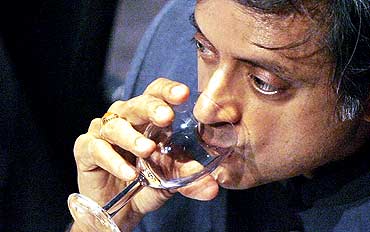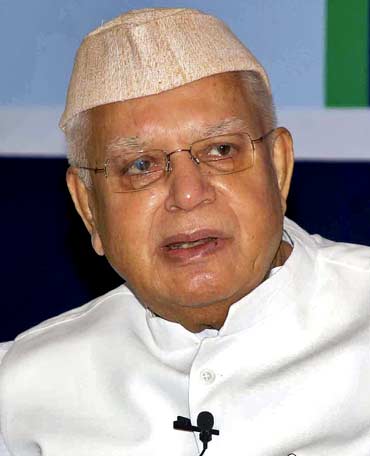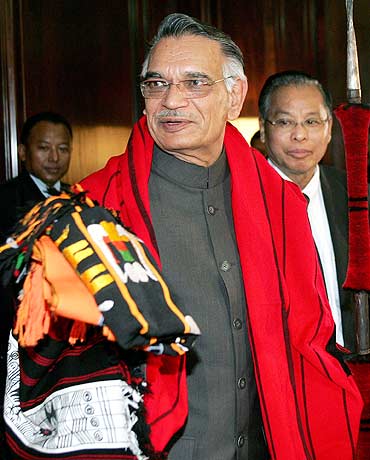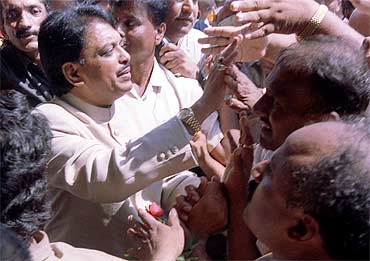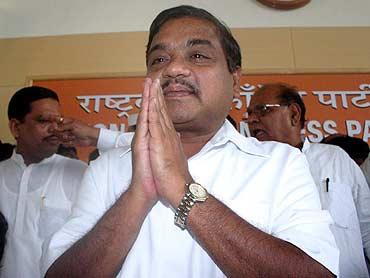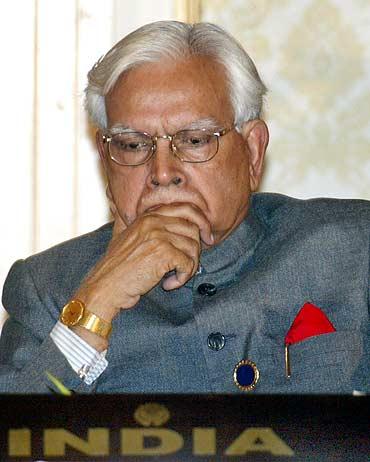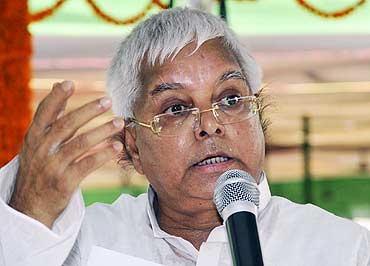 | « Back to article | Print this article |
Neither minister, nor mentor
It was an ignominious exit for the man who was once India's candidate for the post of United Nations secretary general. On Sunday, Minister of State for External Affairs Shashi Tharoor was forced to resign from the Union Cabinet after he got embroiled in the controversy raging over the IPL Kochi team.
Tharoor got into trouble after IPL Commissioner Lalit Modi claimed that Tharoor had advised him against asking questions about the consortium that owns the Kochi team.
It was revealed that Thraoor's 'close friend' Sunanda Pushkar had 'sweat equity' worth Rs 70 crore in Rendezvous Sports World, the consortium that owns the Kochi team. Tharoor's vehement denials and Pushkar's offer to give up her equity failed to cut any ice with senior Congress leaders.
Though Tharoor stoically refused to resign, he was finally forced to do so by the Congress leadership, which was tired of the tweet-happy minister's penchant for controversies.
The Tharoor saga is yet another case of a hitherto clean, credible leader meeting his political waterloo at the hands of a scandal or controversy. Most of these political charades play out a familiar plot: The scam/scandal is exposed, the indignant leader claims he is innocent, the Opposition ups the ante demanding his resignation, the leader clings on to his position and refuses to resign, and finally gives in to immense pressure from the party.
Rediff.com takes a look at some recent high-profile resignations by leaders who went blue in the face proclaiming their innocence.
The 'father' figure
Andhra Pradesh Governor N D Tiwari was no stranger to embarrassing controversies. During his stint as the Uttarakhand chief minister, he was accused of showing extra benevolence in distributing freebies like land and money to several women, politicians and business houses.
To add to his woes, Rohit Shekhar, a law graduate, filed a paternity suit against the Congress leader, claiming that he was born out of a relationship between his mother Ujjwala Sharma and Tiwari.
But all hell broke loose when Telugu television channel ABN Andhra Jyothi aired footage purportedly showing Tiwari in a compromising position with three women in Raj Bhavan. The Raj Bhavan denied it and promptly approached the high court to get a restraint order on the channel from telecasting the footage.
Furious women's rights activists and opposition parties demanded Tiwari's resignation, but the octogenarian leader claimed that he was 'being framed by vested interests' and refused to step down initially.
An embarrassed Congress leadership distanced itself from the scandal and urged the 86-year-old governor to take the 'morally right' decision.
Acting on cue, Tiwari finally sent his resignation to President Pratibha Patil, ironically citing his 'failing health' as the reason.
Though the Congress is hoping that the controversial leader walks away into political twilight, Tiwari, back home in Dehradun, is reportedly considering an electoral comeback.
Patil's 'suit' case
He was a diplomatic, amicable and popular Lok Sabha Speaker. But Shivraj Patil's affable nature did not help him during his stint as India's home minister in the United Progressive Alliance's first five-year term.
As India faced its worst spree of terror attacks in 2008, Patil came under scathing criticism from the opposition and the media alike, due to the inability of his ministry to put an end to the bloody strikes.
As serial blasts rocked Delhi, Ahmedabad, Jaipur and Delhi, public resentment grew against Patil's apparent lack of action. He attracted the wrath of the fourth estate due to his spotless attire while addressing the media in the wake of the Delhi serial blasts. Earlier photographs revealed that the home minister had actually changed his suit thrice, instead of taking charge on the ground, on the day blasts rocked a crowded Delhi market.
The Gandhi loyalist made matters worse when he dismissed demands for his resignation, stating categorically that he would not consider doing so as his 'leader was happy' with him.
But the terror strike on Mumbai, when ten terrorists struck the heart of the city and held the financial capital under siege for almost three days, was the final death knell for Patil's stint as home minister.
Owing moral responsibility, Patil finally handed in his resignation, and was promptly replaced by the tough-talking P Chidambaram.
But Patil's political career did not end, thanks to his perceived closeness to Congress chief Sonia Gandhi. After the Left scuttled chances of him becoming the governor of West Bengal, he was appointed the governor of Punjab.
The Taj Terror Tourist
Shivraj Patil was not the only minister to lose his job over the 26/11 terror strikes on Mumbai. Then Maharashtra Chief Minister Vilasrao Deshmukh and Deputy Chief Minister R R Patil were forced to succumb to public pressure and step down after the worst terror strike in the history of the country.
Deshmukh had faced tremendous flak after his administration and the city police were caught napping when ten terrorists went on a rampage in south Mumbai. The chief minister was severely criticised for speaking about the terror strikes, which claimed 166 lives, in a light tenor at a press conference.
But it was Deshmukh's 'terror tourism' -- when he took his son actor Riteish Deshmukh and director Ram Gopal Varma along with him during a survey of the terror-struck Taj Mahal Hotel -- that paved the way for his ouster. The furious media and the grieving relatives of the victims slammed the chief minister for the insensitive act.
An unrepentant Deshmukh dug in his heels and refused to resign till the Congress top brass in Delhi summoned the chief minister and instructed him to step down. He was replaced by Ashok Chavan.
But the influential leader did not wander around too long in political wilderness. Deshmukh was allotted the coveted heavy industries ministry in the UPA's second tenure at the Centre.
Patil's 'small' slip of the tongue
The then home minister of Maharashtra, R R Patil, was forced to resign after he described the Mumbai terror attacks as a small incident.
At a press conference in the wake of the terror strike, Patil refuted reports about the failure of the city police in apprehending and containing the attack. "Bade shahron mein aise ek adh hadse hote rahte hain. Woh 5,000 logon ko marne aye the lekin humne kitna kum nuksan hone diya (Such small incidents keep on occurring in big cities. They wanted to kill 5,000 people, but we minimised the damage)," he claimed.
The statement drew universal condemnation, though Patil tried to defend himself by saying that he had not meant to make such an insensitive statement and his poor knowledge of Hindi was to blame for the fiasco.
The Nationalist Congress Party leader resigned a day later, saying, "I have gone by my conscience and I have decided to put in my papers."
But Patil was reinstated as the home minister barely a year after the 26/11 terror strike, once the Congress-NCP coalition came back to power in the state with a decisive majority.
Singh and Saddam
United Nations Secretary General Kofi Annan appointed a committee, headed by former chairman of US Federal Reserve Paul A Volcker, to investigate allegations of corruption in the Oil for Food Programme in Iraq.
In its report, the Volcker committee stated that Iraq dictator Saddam Hussein's regime had devised a scheme to fox the UN and pilfer money for itself from the Oil for Food Programme. Among the many firms and politicians indicted by the report, were then external affairs minister Natwar Singh and the Congress party.
Even as the Opposition clamoured for his resignation, Singh stood his ground and refused to step down. He was bolstered by support from Prime Minister Manmohan Singh and Congress chief Sonia Gandhi.
But Singh began losing the support of the Congress top brass when reports confirmed that he had led a four-member delegation to Iraq in January 2001 and that his son Jagat Singh was also in Baghdad in the period.
Soon, Indian Ambassador to Croatia Aniel Mathrani came forward to claim that both Singh and the Congress were allotted oil vouchers by the Saddam regime.
Desperate to save its face, the Congress stripped Singh of the external affairs portfolio and set up an independent probe panel to investigate his role in the scam.
The Justice Pathak Committee report, which was leaked to the media, indicted Singh and his son Jagat for procurement of contracts in the oil-for-food programme. The committee conveniently exonerated the Congress of all charges of being a non-contractual beneficiary in the scam.
An enraged Singh moved a privilege motion against the PM in the Rajya Sabha, which was rejected. He then verbally attacked the PM, calling him 'weak and indecisive'. Singh alleged that the Congress had removed him from the cabinet under pressure from the United States, as he had opposed the government's pro-American stance on various issues.
The Congress reacted by suspending Singh and his son Jagat from the party. The Enforcement Directorate began probing Singh's connection to the oil-for-food scam soon after.
In May 2008, the Supreme Court stayed the ED's proceedings against Singh.
The former Indian foreign service officer and his son joined the Bahujan Samaj Party after their ouster from the Congress. While Jagat abruptly left the BSP to join the BJP, Singh was expelled for 'anti-party activities'.
Fodder for thought
The charismatic Bihar chief minister's name had been whispered in connection to multiple scams since he took over the reins of the state in 1990.
But Lalu Prasad Yadav was named directly by the Central Bureau of Investigation in connection to the Rs 950-crore fodder scam in the mid 1990s. The scam involved millions being siphoned off from the state's animal husbandry ministry to procure fodder, equipment etc for non-existent livestock. Several top bureaucrats, ministers, politicians and businessmen were alleged to be involved in the scam.
The massive scam seriously undermined the Janata Dal leader's claims of being a messiah of the poor and the downtrodden. As pressure mounted on him to resign, a defiant Lalu claimed he was innocent and refused to do so.
Within days of the CBI taking over the investigations, it sought permission to prosecute Lalu.
Sensing the political tide turning against him, Lalu left the Janata Dal to form his own party -- the Rashtriya Janata Dal. Most JD legislators in Bihar assembly joined his party.
A few days before his arrest in connection to the scam, Lalu stepped down as CM and installed his wife Rabri Devi in the post.
His wily move -- to keep the control of the state within his family -- was widely condemned. The barely literate Rabri Devi, who had been a housewife till then and had no political experience, served as the CM of Bihar intermittently till 2005. She was often alleged to be a mere proxy for her husband, who continued to run the state administration.
Lalu went on to become the Union railway minister in UPA's first five-year term, and is often credited for turning around the fortunes of the railways. However, the dismal performance of the RJD in the Lok Sabha polls in 2009, coupled with his frequent squabbles with the Congress, ensured his ouster from the cabinet in the UPA's second term.
